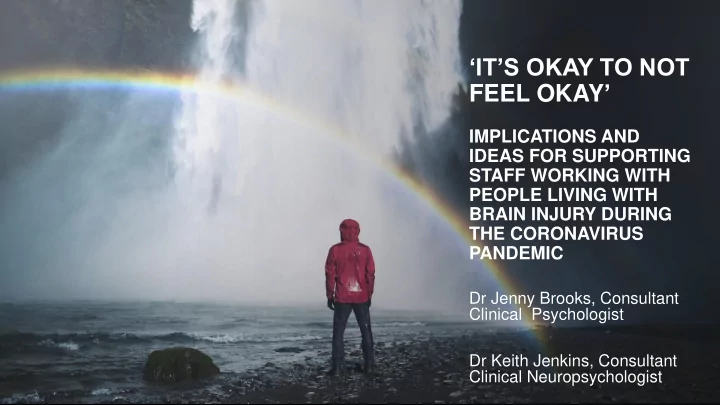

‘IT’S OKAY TO NOT FEEL OKAY ’ IMPLICATIONS AND IDEAS FOR SUPPORTING STAFF WORKING WITH PEOPLE LIVING WITH BRAIN INJURY DURING THE CORONAVIRUS PANDEMIC Dr Jenny Brooks, Consultant Clinical Psychologist Dr Keith Jenkins, Consultant Clinical Neuropsychologist
I am Jenny, I am a Consultant Clinical Psychologist working with people with brain injury, mainly in the community. I worked for many years with people with brain injury in hospitals and residential units.
I am Keith, I am a Consultant Clinical Neuropsychologist. I have worked with people with brain injury for many years. I am also the the Chair of Headway East Northants and ABIF Northants
We will be sharing ideas on: • What psychological reactions are triggered by the Covid-19 Pandemic? • Coping strategies • What may the future hold? • Useful contacts and resources
Thank you for sending us your questions related to issues about working and living through the COVID -19 pandemic. We will read out and answer these towards the end of the webinar.
What psychological reactions are triggered by the Covid-19 Pandemic?
Anxiety Uncertainties: • Am I safe here? Loss of control: • Restrictions & new working practices Fear: • Fight or flight response Am I / we doing it right?: • Concerns about approaches taken to clients/patients
Loss Loss of loved ones • Family/colleagues/clients/ patients/friends • Coping with ambiguous loss Loss of well-being • New physical and emotional concerns
Loss Loss of familiar work routine • New restrictions & concerns about infection control • Working at home Loss of self • ‘Moral injury’ • Guilt
Stress Post Traumatic Stress (PTSD) • Shattering experiences • Flashbacks Chronic stress • Compassion fatigue • Physical health effects Anger / resentment • Feeling unsupported • Frustrations • Stigmatisation
Getting the stress balanced https://mi-psych.com.au/what-is-stress/
Growth Work • Increased camarderie • Team development • Insights about others New personal horizons • Relationships, insight, lifestyle • Resilience Society? • Improved appreciation for keyworkers • Not taking it all for granted
Coping strategies for psychological reactions and it’s okay to not feel okay, at least for a while ……..
Psychological first aid
Psychological First Aid
A Model of General Psychological Adjustment/Coping • Shock / Denial • Anger • Bargaining • Depression • Acceptance / Moving Forwards
FACE COVID F = Focus on what’s in your control A = Acknowledge your thoughts & feelings C = Come back into your body E = Engage in what you’re doing C = Committed action O = Opening up V = Values I = Identify resources D = Disinfect & distance
More on loss issues Bereavement support - informal (colleagues, supervision) - formal (counselling/therapy services) Working changes - at work (PPE, leadership, teamwork) - at home
Moral injury and health Moral injury - at work (leadership, teamwork) - at home (contact, role preservation) Physical and emotional health - at work (PPE, breaks, ‘space’, team) - At home (structure, routine, exercise)
Social contacts and routine - Distancing challenges our well- being - Technology can connect us - Make time for others - Beware too much ‘false news’ and unhelpful web-based chatter. - To maximise well-being look to trusted/official sources
Interacting with the world • Consider limiting or controlling watching news about COVID-19, too much news can lead to a lower mood and more worries for some people • Consider being careful with your social media diet
Working at home • Daily routine • Work space Vs home space • Interaction with colleagues
If you are worried about your mental health talk to your manager/supervisor if you can, or use your employer’s well -being services if they have them speak with your GP If you are feeling unsafe or at risk to yourself you should go to A+E or call 999. There are helplines you can call: Samaritans on 116 123 (24/7) For more helplines visit https://www.nhs.uk/conditions/stre ss-anxiety-depression/mental- health-helplines/
You may have noticed your sleep pattern has changed • Sleep may be affected by changed patterns of life • Sleep may be affected by worries • Sleep may be affected by additional use of alcohol
Go to bed and get up at the same time Daily exercise, but not close to bedtime No caffeine or nicotine close to bedtime Alcohol can reduce the quality of your sleep Avoid upset or stress just before bedtime Reduce your exposure to blue light Have a ‘wind down’ routine Have a cool dark bedroom Keep your bedroom tidy so it feels more relaxing
Your bedroom is mainly for sleeping in. Some people are spending more time in their bedrooms. Consider something to sit on rather than lying on your bed during the day. Try to come out of your bedroom for meals.
If your worries are waking you in the night, you could write down your worries allocate another time to address the worries consider a person you could talk to about your worries such as family friend Colleague / professional GP If you are awake for a long time get out of bed do something else return to bed when you are feeling sleepy
For more information on sleep: Go to https://www.nhs.uk/live- well/sleep-and-tiredness/how- to-get-to-sleep / OR type ‘how to get to sleep NHS’ into your search engine If you have significant concerns about your sleep, that self-help is not fixing Consider speaking with your GP
It is important we all still understand what COVID-19 is and follow the government set rules • Visit government website for up to date advice https://www.gov.uk/coronavirus • There are daily updates on BBC 1 at 17:00 • As decision making is made more individualised , you can still discuss and problem solve with trusted others
Further details of the resources and approaches we have talked about in this presentation will be available using the bibliography in the downloadable script from today’s webinar on the ABIL website www.abil.co.uk
Your Questions
Thank you to: Irwin Mitchell, ABIL, Dawn Baker
Recommend
More recommend